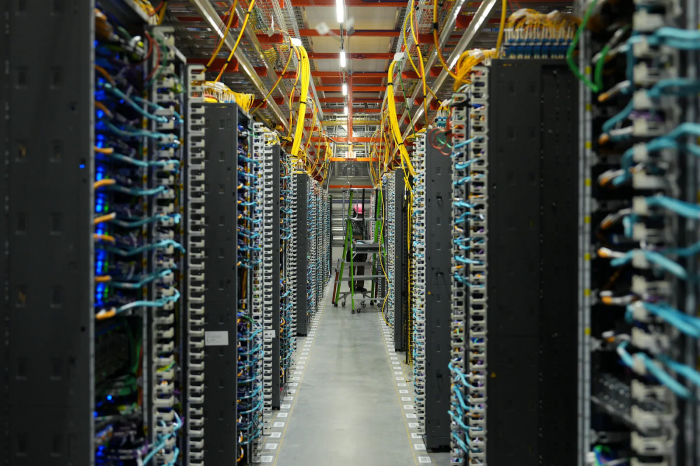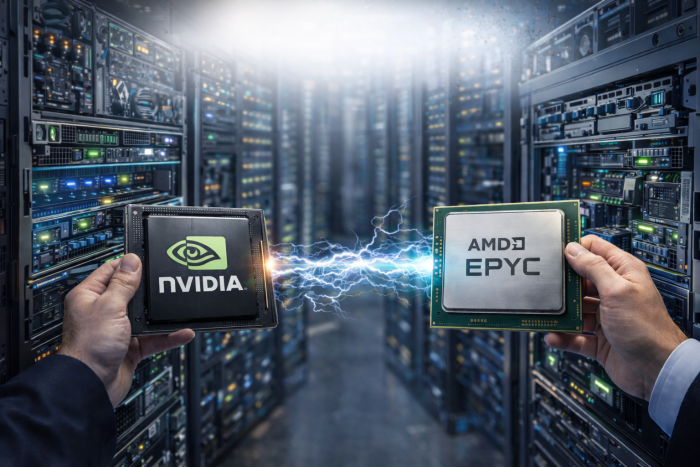On This Page
- A Giant Leap in Cloud AI Infrastructure
- What Exactly Is Project Rainier?
- Inside the Tech: UltraServers & Trainium 2
- Cost-Efficient, Scalable, Sovereign
- The Competitive Landscape: Nvidia, Google, Microsoft
- AI Powering AI: Anthropic’s Claude Models
- Redefining Cloud Infrastructure Strategy
- What’s Next for AWS & Project Rainier?
- Final Take: AWS Raises the Bar
Amazon AWS is building Project Rainier—one of the world’s biggest AI supercomputers, powered by its custom Trainium 2 chips. Discover specs, scale, competition, and implications.
A Giant Leap in Cloud AI Infrastructure
Amazon Web Services (AWS) is pulling back the curtain on Project Rainier—a sprawling AI supercomputing initiative built on custom Trainium 2 chips, designed to power Anthropic’s next-gen Claude models. This initiative marks a seismic shift in cloud infrastructure, aiming to rival Nvidia’s dominance while championing cost efficiency, scalability, and chip sovereignty.
What Exactly Is Project Rainier?

A massive “UltraCluster” spread across multiple U.S. data centers
Comprised of hundreds of thousands of Trainium 2 chips—each offering 650 TFLOP/s BFloat16 and 96 GB HBM3e memory
Built in collaboration with Anthropic following a $4 billion AWS investment, it represents five times more compute power than Anthropic’s prior largest cluster
Rather than a single-room giant, Rainier spans multiple facilities, overcoming power and cooling hurdles while delivering petabit-scale NeuronLink and EFAv3 networking.
Inside the Tech: UltraServers & Trainium 2
The cluster uses compact UltraServers, each housing 64 Trainium 2 chips interconnected via NeuronLink 3.0—a 3D torus network for lightning-fast on-node communication.
Each UltraServer delivers 83 PFLOP/s FP8 compute, with minimal latency achieved through AWS's Elastic Fabric Adapter.
Trainium 2 is optimized for both training and inference, offering 30–40% better performance than Nvidia GPUs per dollar, according to AWS.
Cost-Efficient, Scalable, Sovereign
Why Project Rainier Is a Game Changer:
- Massive Scale: Expected to become the world’s largest AI compute facility
- Chip Sovereignty: Reduces AWS’s reliance on Nvidia by shifting toward in-house silicon
- Efficiency Edge: Trainium 2 claims significant TCO savings for generative AI workloads
Even Reddit users and experts note this is more of a strategic supplement than a replacement for Nvidia’s existing GPU ecosystem.
The Competitive Landscape: Nvidia, Google, Microsoft
- Nvidia still leads in developer support and ecosystem maturity, but AWS’s Trainium 2 challenges on price-performance
- Google and Microsoft are also racing with their TPUs and Azure Maia initiatives
- Trainium 3, due late 2025, is expected to double compute power and improve energy efficiency by 40%
The race is no longer about capacity alone—it’s about who owns the full stack, from chip to model.
AI Powering AI: Anthropic’s Claude Models
Rainier isn’t just tech for tech’s sake—it’s built to serve Anthropic, one of OpenAI’s biggest competitors. Anthropic’s Claude models will use Rainier’s compute to scale toward AGI frontiers.
This partnership follows AWS’s $4 billion investment in Anthropic, making Claude a flagship tenant of Rainier’s ecosystem.
Redefining Cloud Infrastructure Strategy
By designing its own chips (via Annapurna Labs), AWS gains:
- Design-to-deployment control
- Lower operational costs
- Custom optimization for proprietary workloads
Trainium chips will also become more broadly available to EC2 customers, making this tech accessible far beyond Anthropic.
What’s Next for AWS & Project Rainier?
Trainium 3 will debut with 2x compute in late 2025
Global UltraCluster expansion
Claude AI scale-up into next-gen territory
Broader Trainium EC2 integrations across enterprise workloads
AWS is betting big on AI—and it’s betting on itself.
Final Take: AWS Raises the Bar
Project Rainier isn’t just a step forward; it’s AWS redefining the future of hyperscale AI infrastructure. Whether Trainium becomes a dominant force or a strategic edge for AWS, the message is clear: cloud giants are building vertically and faster than ever.
Post Comment
Be the first to post comment!





